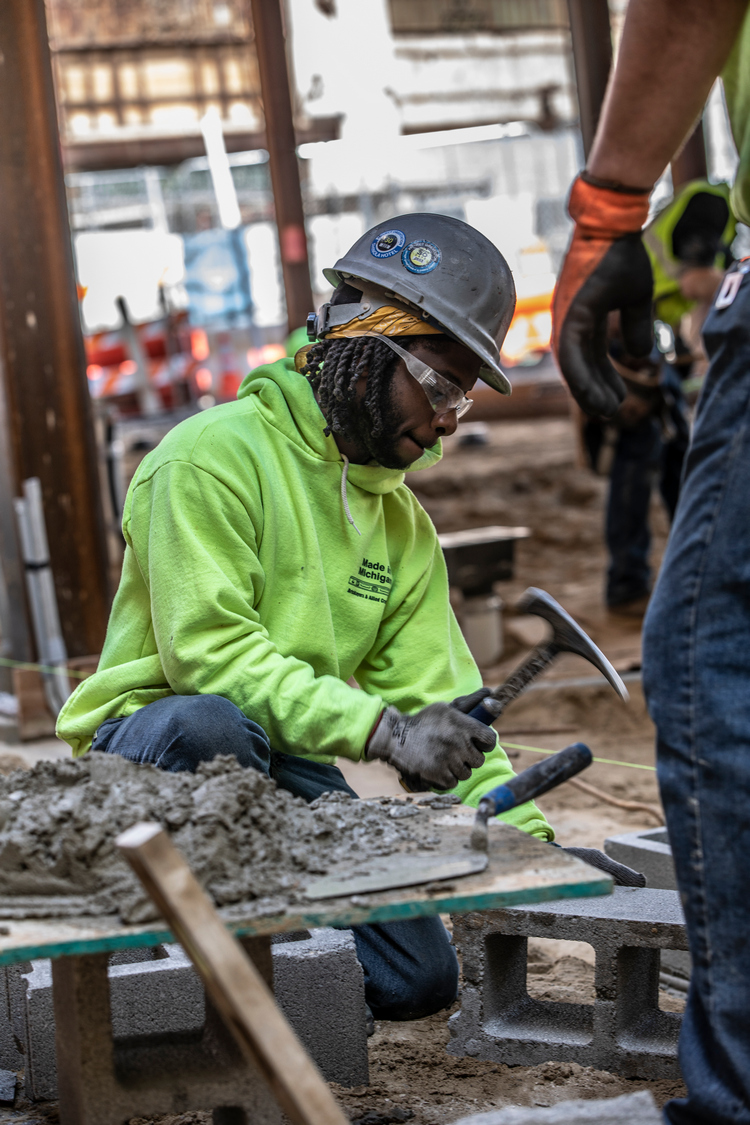
By Dannis Mitchell
The Associated General Contractors of America reports that 89% of contractors are having a hard time finding craft workers and 61% said their firm’s projects are being delayed because of workforce shortages. The number of unfilled construction jobs nationwide neared its highest level in 20 years last July, according to U.S. Bureau of Labor Statistics data. And yet, those statistics also reveal an untapped labor market among minority and women business enterprise communities, with women representing only about 10% of the construction industry’s workforce and African Americans a mere 6%.
Involving MWBE and other disadvantaged business enterprises in construction projects is an often-underutilized solution to address labor shortages; but it also comes with challenges. The hurdles include resources and technical capabilities, limited qualified suppliers and a lack of awareness and communication.
Barton Malow Builders is an employee-owned construction management firm with 15 offices throughout North America. It established a business diversity program over 35 years ago based on a commitment to ensuring fair opportunities for MWBE firms to grow.
Among the program’s goals are to: 1) create more inclusive employment opportunities that mirror the makeup of the diverse communities where the firm builds and 2) achieve greater success on its projects by growing the capacity of local MWBE firms to support the work of its field operations teams led by project managers and superintendents who have direct connections with its subcontractors and trade partners.
The following case studies explore several boots-on-the-ground strategies for construction superintendents to meet their workforce needs, while achieving a project’s MWBE goals and project requirements.
 Recruitment. Barton Malow was part of a joint venture project to build a new arena for the Detroit Red Wings and the Detroit Pistons professional sports teams; better known as the Little Caesars Arena. The owner was a public-private partnership between the city of Detroit and a local development firm. They viewed the project as a catalyst for Detroit’s rebirth and established a community benefits plan that involved a minimum of 30% of the project constructed by Detroit contractors and 51% of the total workforce hours performed by Detroit residents.
Recruitment. Barton Malow was part of a joint venture project to build a new arena for the Detroit Red Wings and the Detroit Pistons professional sports teams; better known as the Little Caesars Arena. The owner was a public-private partnership between the city of Detroit and a local development firm. They viewed the project as a catalyst for Detroit’s rebirth and established a community benefits plan that involved a minimum of 30% of the project constructed by Detroit contractors and 51% of the total workforce hours performed by Detroit residents.
Six months before groundbreaking, the project team developed a community engagement plan that featured a series of outreach meetings to communicate the project’s expected workforce needs. Understanding the challenges of identifying qualified residents and businesses, the team worked in partnership with faith leaders, the city’s workforce development agency and local community and building trades organizations to identify skilled trades pre-apprentice and apprenticeship qualifiers and programs to help train residents interested in participating on the project. Seven workforce career expos allowed residents to meet with skilled trades associations, learn about available training and educational programs, get employed and connect with resources for childcare, legal assistance and more.
 Retention and relationship-building. It can be a challenge to retain a project’s diverse workforce when they don’t have a lot in common with the other workers on the jobsite or struggle to connect with members of their crew. Construction superintendents and the foremen who oversee daily construction activities play a crucial role in breaking down these barriers, building relationships and creating a culture of inclusion.
Retention and relationship-building. It can be a challenge to retain a project’s diverse workforce when they don’t have a lot in common with the other workers on the jobsite or struggle to connect with members of their crew. Construction superintendents and the foremen who oversee daily construction activities play a crucial role in breaking down these barriers, building relationships and creating a culture of inclusion.
In the case of General Motors’ first fully dedicated EV assembly plant in Detroit-Hamtramck, Michigan, the general contractor partnered with the client’s Engineering Group Manager Anthony Monte and his team who believed that when you create an inclusive environment where everybody feels safe, valued and heard, great things can happen.
Strategies included sensitivity training for project superintendents and foremen, focusing on ways to create an environment that’s welcoming for all, and integrating opportunities to reinforce the jobsite culture in the field through storytelling. Examples include toolbox talks and using daily stretch and flex meetings to remind everyone about the project’s commitment to an inclusive environment and culture.
 Employer-driven pre-apprenticeship training. Created in 2016, the Barton Malow Boot Camp is a six-week paid work experience program. The boot camp provides an opportunity for residents ages 18-24 who live in the communities of its projects to learn industry fundamentals needed for entering a career in the skilled trades. The program is an industry outreach collaborative with the firm’s clients, local government, trade unions and professional development partners seeking to create a viable talent pool to support the industry’s trade labor shortage. Participants are assigned a senior-level skilled tradesperson on a project site where they receive mentorship, on-the-job training and perform hands-on trade activities.
Employer-driven pre-apprenticeship training. Created in 2016, the Barton Malow Boot Camp is a six-week paid work experience program. The boot camp provides an opportunity for residents ages 18-24 who live in the communities of its projects to learn industry fundamentals needed for entering a career in the skilled trades. The program is an industry outreach collaborative with the firm’s clients, local government, trade unions and professional development partners seeking to create a viable talent pool to support the industry’s trade labor shortage. Participants are assigned a senior-level skilled tradesperson on a project site where they receive mentorship, on-the-job training and perform hands-on trade activities.
Classroom learnings include construction industry fundamentals, financial literacy, OSHA, conflict resolution, benefits of apprentice career paths and more.
In 2018, Barton Malow served as construction manager for a minor league ballpark for the city of Fayetteville, North Carolina, that now serves as home to the Fayetteville Woodpeckers, the minor league affiliate of the MLB Houston Astros. City officials set a local, small and disadvantaged business participation goal of 30%, while also providing job opportunities for area residents. Using its community engagement strategies for both supplier diversity and workforce development, the firm exceeded the business participation goal at 32% and enrolled 31 residents in the boot camp program.
Industries nationwide are facing an unprecedented labor shortage, and the construction industry is no exception. Builders have a duty to recruit and employ a community’s diverse workforce. Not only does it increase a project’s labor capacity, it ultimately helps the community’s economic growth, gives small and diverse businesses an opportunity to be successful and shows the firm’s commitment to maximizing diversity. Superintendents and their field staff who work directly with trade partners can play a valuable supporting role by referring qualified diverse businesses to work on projects and direct recruitment of women and minorities to create a workforce culture of inclusion.
Dannis Mitchell is the national director of community engagement for Barton Malow Builders.


 Join our thriving community of 70,000+ superintendents and trade professionals on LinkedIn!
Join our thriving community of 70,000+ superintendents and trade professionals on LinkedIn! Search our job board for your next opportunity, or post an opening within your company.
Search our job board for your next opportunity, or post an opening within your company. Subscribe to our monthly
Construction Superintendent eNewsletter and stay current.
Subscribe to our monthly
Construction Superintendent eNewsletter and stay current.